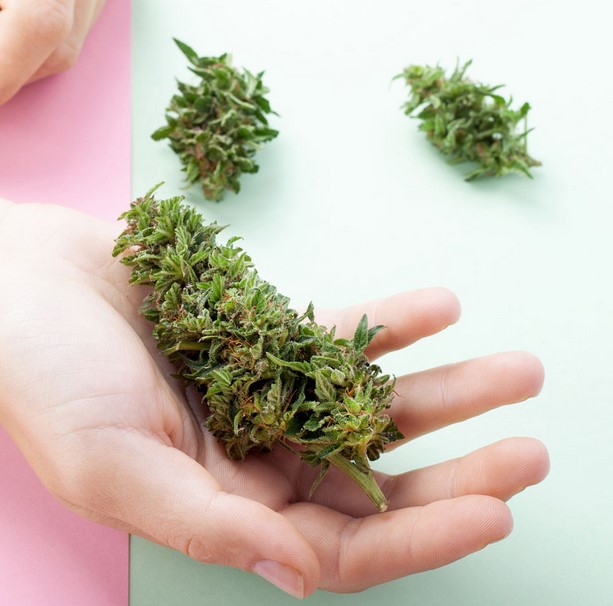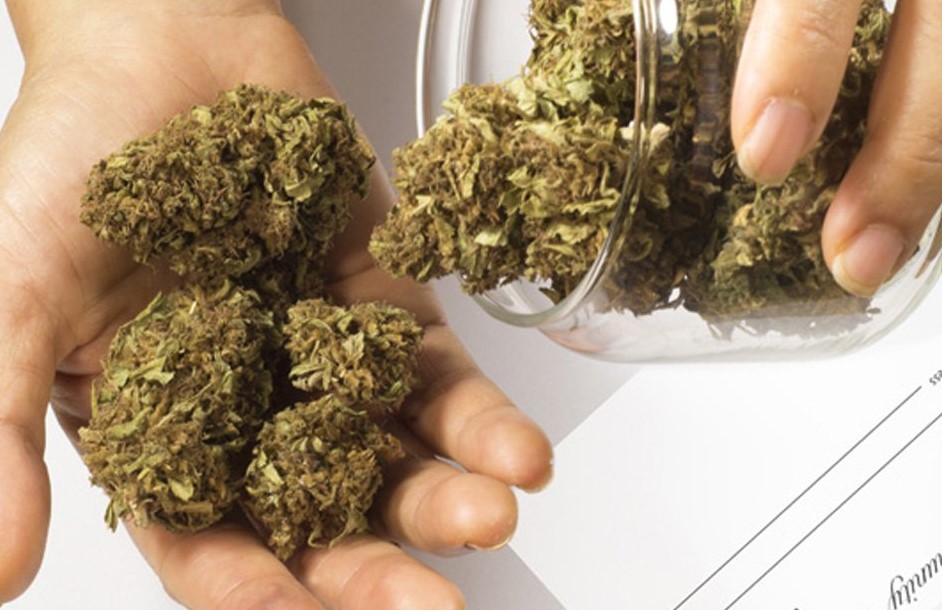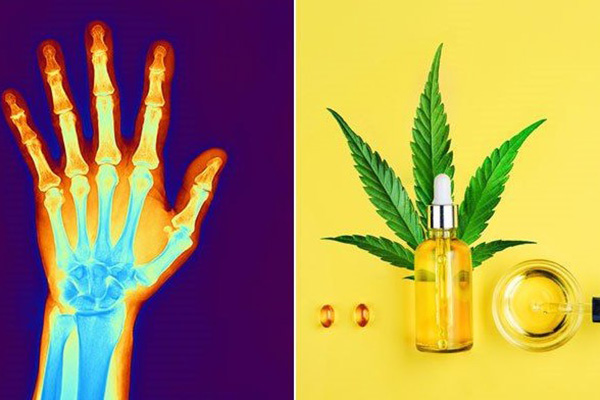Non classé
Medical Cannabis for Inflammation: How Does It Work?
We’ve all experienced the unpleasant sensation of inflammation. Whether it’s in the form of a stomach upset, a skin rash, or a sprained ankle, inflammation is always an undesirable symptom. At least if you had control over it.

We were completely oblivious to the fact that we were in control. Sure, inflammation is unavoidable in certain situations, such as a sprained ankle or a broken bone (basically anything beyond our control). However, the intensity of the symptom may be controlled, and the discomfort caused by it significantly reduced.
This is all possible through a varied healthy diet, which could include high quantities of foods and supplements with anti-inflammatory effects. Nuts, greens, and turmeric are three of the most popular choices. This is not, however, an article on good nutrition.
This is a story about how cannabis may help you manage and reduce inflammation. A rundown of the greatest cannabis strains for reducing inflammation and enabling you to live a healthier, happier, less-inflammation life.
What Causes Inflammation?
Inflammation is the body’s method of defending itself against harm. Toxins, infections, or injuries might all elicit an immune response, resulting in inflammation.
For ages, cannabis has been used to cure inflammation. Cannabinoids are similar to our own endocannabinoids, which are produced in our endocannabinoid system.
How Is Marijuana an Effective Treatment for Inflammation?
Both CBD and THC have anti-inflammatory properties. Another chemical in marijuana, beta-caryophyllene, acts on the CB2 receptor. During a 2008 study, researchers analyzed mice with swollen paws. Oral beta-caryophyllene doses were given to the mice, resulting in a 70% decrease in inflammation. The mice that didn’t have CB2 receptors did not improve.
CBD and THC work together to treat and prevent inflammation. They are also able to reduce both the production and release of pro-inflammatory cytokines. They also limit LPS-induced STAT 1 transcription factor activation, which is involved in certain inflammatory processes. Since CBD appears to be most effective in reducing inflammation, CBD-rich marijuana strains may be beneficial for individuals with severe chronic pain.
What Symptoms of Inflammation Can Medical Marijuana Treat?
CBD, unlike THC, is not psychoactive and therefore does not produce a “high.” CBD has been shown in studies to help support the concentration of endocannabinoids that enable your body to fight disease and heal itself.
Endocannabinoids help to control:
- Muscle tone
- Pain
- Appetite
- Mood state
- Inflammation
There are over 100 distinct cannabinoids in marijuana, allowing it to modulate the descending and ascending pain pathways with numbness and analgesia, as well as anti-inflammatory and neuroprotective actions.
How to Get Medical Marijuana for Inflammation
Not every state allows patients to use medical marijuana for pain. To discover if you qualify, meet with a qualified medical marijuana doctor in your area. A doctor can answer your queries and assist you in obtaining the treatment you require.
Best Methods of Marijuana Treatment to Use to Treat Inflammation
It is becoming increasingly popular to use cannabis as a substitute for prescription drugs, which can have unpleasant addiction and negative effects. In many situations, medical marijuana for inflammation is a better quality of life option than traditional medication.
Methods of administering cannabis and inflammation treatment include:
- Inhalation
Patients are now turning to vaporizers as a “go-to” method for administering medical marijuana via inhalation.
- Oral
Medical marijuana is absorbed differently by mouth than through the lungs. Titration of dosages is more time consuming, and action commencement is delayed. It’s also a cost-effective and simple inflammation cure method employing medical marijuana.
- Transdermal
Cannabinoids, such as CBD and THC, are fat and alcohol soluble. When cannabinoids are included in a formulation, they pass from the patch to your skin and into your bloodstream.
- Topical
Lotions, oils, creams, and patches are all forms of topical applications. Topical treatments have the potential to cure a wide range of ailments. They’re long-lasting, non-psychoactive, non-invasive, and simple to utilize.
- Suppositories
Suppositories are a type of medication that can be beneficial if you need some heavy-duty assistance. While it is an uncommon mode of administration, it may be useful if you’re searching for “on the road” therapy. Refrigerate the medicine before using it. This process is quick, long-lasting, and effective.
- Sublingual
Sublinguals are available in tinctures and essential oils. They’re quick and simple to dose. They’re handy, as well as the preferred method for children.
When you’re ready to begin your marijuana therapy for inflammation, consider the following factors while selecting a medical marijuana clinic:
- Selection of cannabis available
- Quality of marijuana
- Attention to customers
- Price of weed
- Safety and health regulations
- Delivery and location services
- Transparency
Best Strains of Marijuana for Inflammation
Cannatonic
This souche, Cannatonic, has previously been covered by us. CBD is abundant in this strain called Cannatonic. This is a 1:1 ratio of CBD and THC, making Cannatonic a unique kind of cannabis. Cannatonic is a Spanish cannabis cultivar that is the result of crossing Reina Madre and NYC Diesel. Because its CBD content may help to minimize paranoia and psychosis induced by THC, Cannatonic makes an excellent choice for beginners.
Harlequin

Another CBD-dominant cannabis strain is Harlequin. Harlequin is also great for beginning marijuana users. This Sativa-rich strain has a 5:2 CBD:THC ratio and high levels of both CBD and THC. This strain has even more CBD than Cannatonic, but also a “reasonable” amount of THC. Because to its high CBD proportion, Harlequin is also a great strain for beginners because it helps with pain and inflammation reduction. Both cannabinoids (CBD and THC) are chemicals that reduce pain and inflammation. In sports where there is contact, CBD has been used to decrease joint discomfort and soreness.
Harlequin is a wonderful cannabis strain for the treatment of arthritis. It’s also unlikely that you’ll get THC-induced paranoia because to its high CBD content.
CBD OG
CBD OG is a kind of cannabis cultivated using high-CBD strains. CBD OG is a fantastic strain to use for pain reduction. CBD OG has a 2:1 CBD:THC ratio. It has a 10% CBD content (5% THC). This isn’t an Indica that you can get high on since its THC level is low. CBD OG is an excellent medical marijuana strain. If you’re looking for something that reduces inflammation, try CBD OG. It’s ideal for individuals who don’t tolerate THC well.
ACDC
The inflammation-reducing qualities of Marijuana is well-known. CBD rich cannabis strains include ACDC and Harlequin. This strain’s CBD content is quite high, making it a great choice for patients with cancer or other chronic diseases that need an anti-inflammatory medication. Many people enjoy this strain because it helps relieve pain in the muscles and joints without causing euphoric side effects associated with THC.
Tangie Sunrise
The Tangie Sunrise strain is a THC-rich variety that makes the consumer feel euphoric and optimistic. Tangie Sunrise has a lot of THC (16 percent) and is excellent for reducing inflammation, stress, tiredness, and depression. Tangie Sunrise is a cross between Jack Herer and Orange Crush.
Girl Scout Cookies
GSC is a high-THC version of the Girl Scout Cookies strain, which is also known as GSC. This variety, like many others on this list, belongs to the Kush family. OG Kush and Durban Poison are the parents of Girl Scout Cookies. Chronic inflammation can be treated effectively with Girl Scout Cookies.
The Gift
The Gift is a CBD-rich strain with a low THC level, also known as RG8. This cannabis variety is excellent for people looking for stress relieving and anti-inflammatory effects without the high or psychedelic side effects caused by THC. The Gift is wonderful for people seeking anti-inflammatory benefits without the worry of paranoia or madness. The Gift is also indicated to help with arthritis and insomnia.
The Anti-Inflammatory Benefits of Cannabis
Cannabinoids are chemical compounds found in the cannabis plant, including THC and CBD. There are 113 known cannabinoids so far, but there may be many more to be discovered as researchers and botanists conduct research into the legal cannabis industry due to growing public interest.
Cannabinoids have been found to reduce inflammation and relieve the symptoms it causes, much like other functional foods. Pain, tiredness, and an uncomfortable feeling are all symptoms of inflammation.
Cannabinoids’ anti-inflammatory qualities have made cannabis a focus of interest in the study of autoimmune diseases like multiple sclerosis, rheumatoid arthritis, colitis, and hepatitis because the reduction of inflammation might aid patients suffering from these illnesses.
According to Nagarkatti (2010), cannabinoids can “also be useful in certain types of cancers that are induced by chronic inflammation.” They have a quick impact on tumor development by reducing inflammation.
What To Look For In Cannabis For Inflammation
The most potent and widely studied cannabinoid in terms of fighting inflammation is CBD. Because to its legality in all 50 states across the United States and its lack of psychoactive effects, it is quite popular.
Cannabidiol (CBD) has been utilized for decades to decrease inflammation and treat localized physical pain. CBD, like THC (psychoactive component of cannabis), is also present in marijuana, although larger quantities of the cannabinoid are present in the hemp plant. Hemp is a non-psychoactive derivative of the marijuana plant with greater amounts of CBD.
CBD has been found to possess a wide range of diverse health advantages as a cannabinoid. Among them are incredible anti-inflammatory effects. As a result, the majority of the strains on the list below have a higher CBD content.
Side Effects of Marijuana for Inflammation
Marijuana is a safe and natural alternative to conventional anti-inflammatory drugs, with few negative consequences, when compared to other inflammation treatments and the known adverse effects of traditional anti-inflammatory medicines. While marijuana has the potential to have a variety of impacts on the body, most side effects are minor and go away after you stop using it.
Some of the common side effects of marijuana include:
- A high sensation: Many people like the “high” feeling that marijuana provides, particularly when it is rich in THC. Many individuals enjoy this sense of euphoria, but it’s worth noting and planning for the fact that this high might cause problems such as driving and employment.
- Drowsiness: When you use cannabis to cure inflammation or other symptoms, you may feel tired. This sensation might cause problems with many daytime activities. When attempting to fall asleep, however, it can be advantageous. Sativa-dominant strains are preferable if you need to stay awake.
- Increased appetite: Some people who use medical marijuana claim to have increased hunger. This can be either a beneficial or detrimental side effect, depending on the person. It’s typically a plus if the patient has a poor appetite or needs to gain weight for medical reasons.
Inflammation is an uncomfortable and dangerous condition. Many patients find the various potential marijuana side effects to be valuable in treating inflammation. When compared to traditional anti-inflammatory drugs and other forms of therapy, medical marijuana is both inexpensive and natural.


